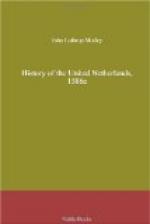The “people,” therefore, thus enthroned by the Leicestrians over all the inhabitants of the country, appeared to many eyes rather a misty abstraction, and its claim of absolute sovereignty a doctrine almost as fantastic as that of the divine right of kings. The Netherlanders were, on the whole, a law-abiding people, preferring to conduct even a revolution according to precedent, very much attached to ancient usages and traditions, valuing the liberties, as they called them, which they had wrested from what had been superior force, with their own right hands, preferring facts to theories, and feeling competent to deal with tyrants in the concrete rather than to annihilate tyranny in the abstract by a bold and generalizing phraseology. Moreover the opponents of the Leicester party complained that the principal use to which this newly discovered “people” had been applied, was to confer its absolute sovereignty unconditionally upon one man. The people was to be sovereign in order that it might immediately abdicate in favour of the Earl.
Utrecht, the capital of the Leicestrians, had already been deprived of its constitution. The magistracy was, according to law, changed every year. A list of candidates was furnished by the retiring board, an equal number of names was added by the governor of the Province, and from the catalogue thus composed the governor with his council selected the new magistrates for the year. But De Villiers, the governor of the Province, had been made a prisoner by the enemy in the last campaign; Count Moeurs had been appointed provisional stadholder by the States; and, during his temporary absence on public affairs, the Leicestrians had seized upon the government, excluded all the ancient magistrates, banished many leading citizens from the town, and installed an entirely new board, with Gerard Proninck, called Deventer, for chief burgomaster, who was a Brabantine refugee just arrived in the Province, and not eligible to office until after ten years’ residence.
It was not unnatural that the Netherlanders, who remembered the scenes of bloodshed and disorder produced by the memorable attempt of the Duke of Anjou to obtain possession of Antwerp and other cities, should be suspicious of Leicester. Anjou, too, had been called to the Provinces by the voluntary action of the States. He too had been hailed as a Messiah and a deliverer. In him too had unlimited confidence been reposed, and he had repaid their affection and their gratitude by a desperate attempt to obtain the control of their chief cities by the armed hand, and thus to constitute himself absolute sovereign of the Netherlands. The inhabitants had, after a bloody contest, averted the intended massacre and the impending tyranny; but it was not astonishing that—so very, few years having elapsed since those tragical events—they should be inclined to scan severely the actions of the man who had already obtained by unconstitutional means the mastery of a most important city, and was supposed to harbour designs upon all the cities.




